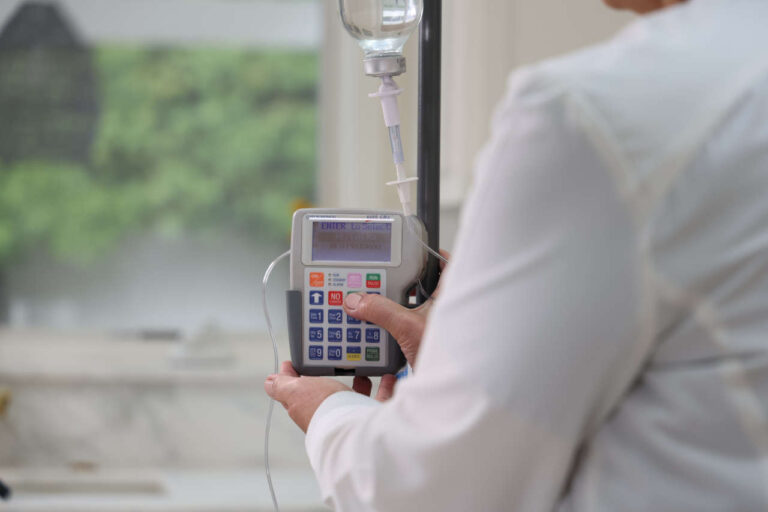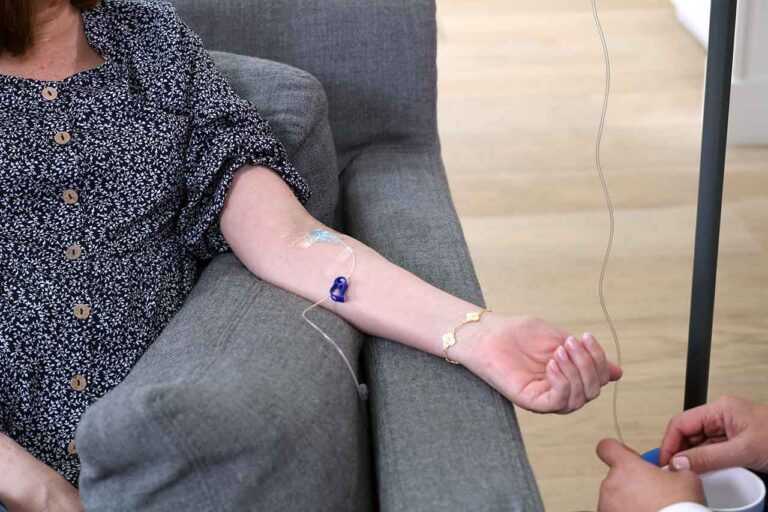
Birdshot retinochoroidopathy (BRSC), also known by other terms like birdshot uveitis, birdshot chorioretinopathy, or HLA-A29 uveitis, is a rare and potentially sight-threatening disease that affects both eyes and can lead to permanent vision loss if not treated early.
Uliza Kuhusu Uingizaji wa Nyumbani wa IVIG
Since there is no cure for BSRC, corticosteroids or immunosuppressive drugs are used as standard treatments to manage the condition in affected individuals. However, some patients experience serious side effects from these medications and seek alternative treatments like intravenous immunoglobulin (IVIG) infusions.
IVIG therapy has proven effective in treating the symptoms of BSRC in many patients, especially those who don’t respond well to the standard treatment (i.e., corticosteroids or immunosuppressive drugs).
Read further to learn how IVIG can help patients with birdshot chorioretinopathy, how this therapy works, and what you can expect during treatment with IVIG.
Birdshot Retinochoroidopathy: Brief Overview
Birdshot retinochoroidopathy is a chronic (long-term) eye disease caused by an abnormal attack on the immune system. It is also known as a T-cell-mediated autoimmune disorder. T-cells trigger an immune response against the retina and choroid, two important components of your eyes that are responsible for vision.
Research has demonstrated that T-cell activation is strongly associated with the human leukocyte antigen (HLA) A29 allele, and more than 95% of BSRC patients carry this gene variant.
The HLA-A29 activates the cytotoxic T-cells, which then target and attack the retinal and choroidal tissues, leading to progressive inflammation and damage. As a result, patients with birdshot retinochoroidopathy experience visual disturbances like blurred vision, floaters (small moving spots in the vision field), and peripheral vision loss over time.
In short, genetics, along with the immune system, are responsible for the onset of this disease. Also, birdshot retinochoroidopathy is a chronic disease; therefore, affected individuals require long-term treatment to slow the disease progression and preserve vision.
IVIG Therapy and Birdshot Retinochoroidopathy: Clinical Evidence
A case report published in the journal “Ocular Immunology and Inflammation” highlighted the positive effects of intravenous immunoglobulin (IVIG) in treating birdshot uveitis. The study found that patients who did not respond to standard treatments, such as immunosuppressive drugs or steroids, experienced significant improvements in their vision after receiving IVIG therapy. The treatment regimen consisted of IVIG administered at a dose of 1.6 g/kg every 4 weeks for 6 months, followed by infusions of 1.2 to 1.6 g/kg at 6 to 8-week intervals.
Similarly, another case report of 18 patients with active birdshot retinochoroidopathy showed that, after IVIG infusions, 53% showed significant improvement in vision, while 29% remained stable. Additionally, eye inflammation was reduced in 81% of patients, and macular swelling (edema) improved in 65% of cases.
This, and several other small case studies, reported that IVIG could be a safe and potentially effective treatment for birdshot uveitis when standard treatments are refractory. However, large-scale clinical trials are limited regarding the long-term use of IVIG therapy in birdshot retinochoroidopathy patients.
How Does IVIG Work in Patients With Birdshot Retinochoroidopathy?
The exact mechanism of IVIG therapy in managing this autoimmune condition is unclear. However, several case studies have reported that IVIG has multiple modes of action that may help slow vision loss and reduce inflammation and flare-ups in patients with BSRC.
Pata Usaidizi wa Copay wa IVIG
IVIG Financial AssistanceIVIG and Mechanisms of Action

IVIG therapy delivers immunoglobulin (antibodies) derived from the pooled plasma of thousands of healthy donors. These antibodies regulate the immune system, either by maintaining the IgG levels in patients with immunodeficiency or calming down the overactive immune system in patients with autoimmune conditions.
In the case of birdshot retinochoroidopathy, which is also an autoimmune condition, IVIG helps suppress the overactive immune system to prevent the immune cells from further damaging the retinal tissues. In these patients, IVIG may work in several ways:
1. It Modulates the T Cell Activity
IVIG suppresses the overactive T cells and reduces the immune response against retinal and choroidal tissues. In short, IVIG prevents further damage.
2. It Blocks the Activity of Autoantibodies
The antibodies provided during the IVIG treatment neutralize the effect of harmful autoantibodies and prevent them from attacking retinal tissues.
3. It Reduces Intraocular Inflammation
IVIG has anti-inflammatory effects, which help to reduce intraocular inflammation (inflammation occurs inside the eye) by decreasing the inflammatory signals (IL-17 and IFN-γ) and promoting the release of anti-inflammatory cytokines (molecules that reduce inflammation). This also potentially reduces the need for treatment with steroids and other immunosuppressants.
4. It Enhances the Function of Regulatory T Cells
Normally, the regulatory T cells (also called Tregs) suppress the excessive immune responses. However, in the case of BSRC, these cells do not work properly and contribute to uncontrolled T-cell activity and chronic inflammation.
IVIG therapy enhances the activity of regulatory T cells, which help prevent autoimmune attacks and inflammation.
Benefits of IVIG for Patients With Birdshot Retinochoroidopathy
Unlike standard treatments of birdshot retinochoroidopathy, IVIG offers several benefits to patients, such as:
- It is generally well-tolerated and has fewer side effects than steroids and immunosuppressive drugs (such as methotrexate, mycophenolate mofetil, or anti-TNF agents) that can cause weight gain, osteoporosis, diabetes, or liver and kidney toxicity.
- It has long-lasting effects (given every 3 – 4 weeks) compared to traditional BSRC medications that are typically required daily.
- It is more effective, especially in patients who do not respond to conventional therapies.
- It reduces intraocular inflammation and prevents further vision loss by suppressing the overactive immune response.
Note: Individual responses to IVIG therapy may vary significantly. While some patients can experience rapid improvement within weeks, others may require longer treatment durations to achieve optimal results.
Je, IVIG inaweza kusaidia?
Maelezo ya Matibabu ya IVIG ya BureWhat Can You Expect During IVIG Treatment?
During IVIG treatment, your healthcare provider will administer the medication through an intravenous (IV) infusion. The infusion process typically takes 2 – 6 hours to complete and is repeated every 3 – 4 weeks, depending on your response.
You may experience some mild madhara like headache, fatigue, fever, or nausea during or after the IVIG infusions. Talk to your doctor if you suffer from any of these symptoms.
Takeaway
Birdshot retinochoroidopathy is a rare but chronic eye disease that requires long-term management to prevent vision loss. Although conventional treatments like corticosteroids and immunosuppressants remain the standard of care, IVIG therapy can be used as an alternative treatment for patients with treatment-resistant diseases or those who cannot tolerate standard therapies.
If you or your loved one is interested in IVIG, you should discuss the risks, benefits, and accessibility with your ophthalmologist and immunologist before switching to IVIG.
MAREJEO:
- Menezo, V., & Taylor, S. R. (2013). Birdshot uveitis: Current and emerging treatment options. Clinical Ophthalmology (Auckland, N.Z.), 8, 73. https://doi.org/10.2147/OPTH.S54832
- Minos, E., Barry, R. J., Southworth, S., Folkard, A., Murray, P. I., Duker, J. S., Keane, P. A., & Denniston, A. K. (2016). Birdshot chorioretinopathy: current knowledge and new concepts in pathophysiology, diagnosis, monitoring, and treatment. Jarida la Orphanet la Magonjwa Adimu, 11(1). https://doi.org/10.1186/s13023-016-0429-8
- LeHoang, P., Cassoux, N., George, F., Kullmann, N., & Kazatchkine, M. D. (2000). Intravenous immunoglobulin (IVIg) for the treatment of birdshot retinochoroidopathy. Ocular Immunology and Inflammation, 8(1), 49–57. https://doi.org/10.1076/0927-3948(200003)811-sft049
- Cassoux, N., Goichot-Bonnat, L., Karmochkine, M., Georges, F., Kullmann, N., Lehoang, P., & Kazatchkine, M. (2002). [Efficacy of intravenous immunoglobulin in the treatment of Birdshot retinochoroiditis]. PubMed, 25(1), 23–30. https://pubmed.ncbi.nlm.nih.gov/11965114
- Garcia-Geremias, M., Carreño, E., Epps, S. J., Lee, R. W. J., & Dick, A. D. (2015). Clinical outcomes of intravenous immunoglobulin therapy in refractory uveitis. International Ophthalmology, 35(2), 281–285. https://doi.org/10.1007/s10792-015-0051-0
- Whitcup, S. M., & Sen, H. N. (2021). Whitcup and Nussenblatt’s uveitis: fundamentals and clinical practice. Elsevier Health Sciences (5th Edition). https://books.google.com.pk/books?id=o7cmEAAAQBAJ&dq=IVIG+treatment+for+Birdshot+retinochoroidopathy&lr=&source=gbs_navlinks_s
- Karmochkine, M. (1998). Intravenous immune globulin in autoimmune uveitis. Annals of Internal Medicine, 129(12), 1078. https://doi.org/10.7326/0003-4819-129-12-199812150-00030
- Rosenbaum, J. T., George, R. K., & Gordon, C. (1999). The treatment of refractory uveitis with intravenous immunoglobulin. American Journal of Ophthalmology, 127(5), 545-549. https://doi.org/10.1016/S0002-9394(99)00029-X












